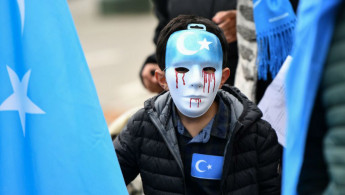Follow us on Facebook, Twitter and Instagram to stay connected
US seizes 'human hair' shipment 'made in Uighur forced labour camps'
A shipment of almost $1 million worth of hair products were seized by US customs, on suspicions they were made in forced Uighur labour camps.
3 min read
Many detained Uighurs are sent to labour camps [Getty]
US Customs and Border Protection Officers impounded a shipment of almost $1 million in wigs and other products made from human hair, which are believed to have come from Uighur Muslim women at forced labour camps in Xinjiang, China.
If the products can be traced definitively back to a Chinese labour camp, it could provide crucial proof of Chinese government human rights abuses against the Uighur Muslim minority, which have been widely documented by monitors and media.
US officials suspect the goods, which includes almost 13 tonnes of wigs and other human hair products, were made in forced labour conditions, according to Axios.
On 17 June, Customs Border Patrol (CBD) issued a withhold release order for Lop County Meixin Hair Product Co. Ltd. in southern Xinjiang, requiring ports of entry in the US detain any shipments entering from that company.
The holding the shipment indicates that border officials could have uncovered strong evidence that linked the products to forced labour.
"The production of these goods constitutes a very serious human rights violation, and the detention order is intended to send a clear and direct message to all entities seeking to do business with the United States that illicit and inhumane practices will not be tolerated in U.S. supply chains," Brenda Smith, executive assistant commissioner of the CBP Office of Trade, said in a statement.
"If this highly suspicious, 13-ton shipment of human hair indeed turns out to be linked to the Uighur concentration camps, then this is a new low - even for the Chinese Communist Party - and they will have to answer to the world community for their actions," National Security Council spokesperson John Ullyot told Axios.
Forced labour camps
The chorus of condemnation against China's alleged internment of Uighur Muslims in the Xinjiang and other regions is growing stronger.
|
A 60-page document submitted to the British government in April set out the legal case for HM Revenue and Customs (HMRC) to ban all cotton originating from the Xinjiang region of China, home of the Uighur.
The submission made by Global Legal Action Network (GLAN), together with activist group the World Uyghur Congress (WUC), comes amid growing concerns that the Muslim minority are being transferred to factories across China to replace workers during the coronavirus lockdown.
Large brands such as H&M, Uniqlo, Muji and Ikea were all named in the documents as sourcing cotton from Xinjiang.
During the Covid-19 pandemic pictures and videos purporting to show uniformed Uighur workers being transferred to factories across the country have been circulated.
Reports of members of the Uighur Muslim minority being detained in "re-education" camps first emerged in 2016.
The United Nations human rights panel has since said there are credible reports of more than one million Uighurs being held in internment camps in Xinjiang. Uighur activists say that many have been disappeared or killed in the camps, and that others have been forced to work in factories.





 Follow the Middle East's top stories in English at The New Arab on Google News
Follow the Middle East's top stories in English at The New Arab on Google News


